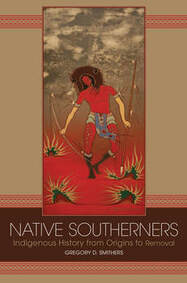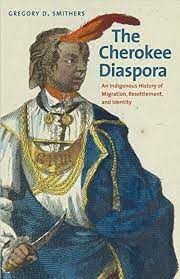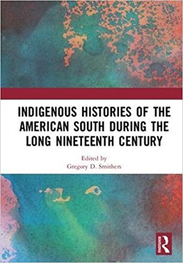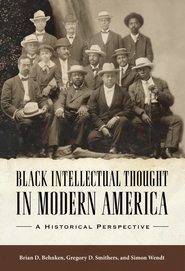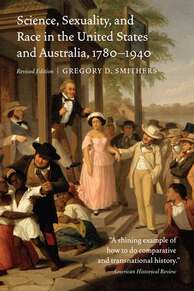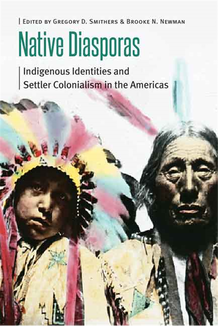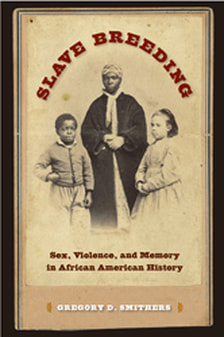|
Long before the indigenous people of southeastern North America first encountered Europeans and Africans, they established communities with clear social and political hierarchies and rich cultural traditions. Award-winning historian Gregory D. Smithers brings this world to life in Native Southerners, a sweeping narrative of American Indian history in the Southeast from the time before European colonialism to the Trail of Tears and beyond.
In the Native South, as in much of North America, storytelling is key to an understanding of origins and tradition—and the stories of the indigenous people of the Southeast are central to Native Southerners. Spanning territory reaching from modern-day Louisiana and Arkansas to the Atlantic coast, and from present-day Tennessee and Kentucky through Florida, this book gives voice to the lived history of such well-known polities as the Cherokees, Creeks, Seminoles, Chickasaws, and Choctaws, as well as smaller Native communities like the Nottoway, Occaneechi, and Haliwa-Saponi. Find out more here. “Native Southerners tries to rectify prejudices and limitations by focusing on the histories of Indian tribes in the South with an emphasis upon their own stories. Gregory D. Smithers’s use of oral histories is a highlight of his work, and he also covers the ongoing reality of climate change in the development of southern tribes. Many themes emerge, but one—the endless effort to maintain communal identity in the face of colonization, disease, and displacement—is most powerful.” —Tim Kaine, U.S. Senator from Virginia “Native Southerners is a journey through centuries of southern Native American history. This thoughtful and sensitive narrative offers a compelling perspective on the clashes between Natives and Europeans, which forever changed the lives of the southern Native population.” --Lynette Allston, Chief of the Nottoway Indian Tribe of Virginia “Ranging from Virginia to Indian Territory and covering the era of paramount chiefdoms to the post-Removal years, Native Southerners will be the go-to book for teachers and researchers for many years to come. An indispensable work for all scholars of southern Indians.” --Angela Pulley Hudson, author of Creek Paths and Federal Roads: Indians, Settlers, and Slaves and the Making of the American South “Indigenous actors and voices are front and center in this graceful narrative of the Native South, testifying to their survival and adaptability even as waves of aggressive settlers sought their removal and extinction. Native Southerners is well suited for the classroom and a handy reference for specialists.” —Andrew K. Frank, author of Before the Pioneers: Indians, Settlers, Slaves, and the Founding of Miami “Employing the voluminous amount of secondary works dealing with southern Native Americans that have been published in the last two decades, Gregory D. Smithers has written a short and accessible overview of the southern Indian experience up to 1840 that will have great value for college students and professors alike.”— Southwestern Historical Quarterly |
|
The Cherokee are one of the largest Native American tribes in the United States, with more than three hundred thousand people across the country claiming tribal membership and nearly one million people internationally professing to have at least one Cherokee Indian ancestor. In this revealing history of Cherokee migration and resettlement, Gregory Smithers uncovers the origins of the Cherokee diaspora and explores how communities and individuals have negotiated their Cherokee identities, even when geographically removed from the Cherokee Nation headquartered in Tahlequah, Oklahoma. Beginning in the eighteenth century, the author transports the reader back in time to tell the poignant story of the Cherokee people migrating throughout North America, including their forced exile along the infamous Trail of Tears (1838–39). Smithers tells a remarkable story of courage, cultural innovation, and resilience, exploring the importance of migration and removal, land and tradition, culture and language in defining what it has meant to be Cherokee for a widely scattered people.
"Essential reading for anyone interested in the Cherokee, as it deftly documents how they determine who is a blood relative and why that matters, both in the past and today."—Library Journal, starred review "Smithers’ account of the Cherokee is a welcome addition to the literature of American history. He brings an uncommon depth to the story of a part of southern American culture that is often either ignored, or glossed over."—Roanoke Times "Smithers explores the creation and re-creation of a Cherokee national identity from the 18th century to World War II."—True West "Gregory D. Smithers provides a welcome, valuable description and analysis of a very complex set of historical facts, cultural mores, political realities, and individual decisions that shaped the ‘Cherokee Diaspora.’"—Marcia Haag, American Indian Culture and Research Journal "In Diaspora, Smithers identifies the foundation for a new synthesis of the history of one of North America’s most thoroughly studied indigenous peoples."—Andrew Denson, Western Historical Quarterly "Smithers offers a comprehensive tribal history from the Cherokee diaspora’s Revolutionary-era origins through the early twentieth century."—Jonathan Hancock, North Carolina Historical Review "Smithers draws upon an array of scholarship and extensive archival research to explore the interconnected concepts of migration, memory, and identity."—Tyler Boulware, Journal of Interdisciplinary History "Smithers has tried something new, seeking to set the history of Native North America on a different footing that engages with broader inquiry into transnational themes of identity, memory, and history."—James Taylor Carson, Southern Spaces "Smithers does a tremendous service to both Cherokee historiography and historical memory. No future work will be able to ignore his interpretation. By demonstrating how the oft-separate fields of Indigenous, diaspora, and migration studies can benefit from being in conversation with one another, Smithers offers a fruitful roadmap that future scholars would be wise to utilize."—John R. Gram, Journal of Native American and Indigenous Studies Finalist in the 2016 Oklahoma Book Award competition in the non-fiction category Selected as a Best of the West 2016 title in True West magazine Received an Award of Excellence from the East Tennessee Historical Society Winner of the 2016 Historical Book Award given by the North Carolina Society of Historians Winner of the 2017 Independent Publisher Book Awards, in the non-fiction Multicultural Book category "Showing us the way, Smithers superbly demonstrates the complexity inside the Cherokee Nation moving fire to rebuild in a new homeland. This is a valuable ethnohistorical contribution to diasporic studies."—Donald L. Fixico, author of Call for Change: The Medicine Way of American Indian History, Ethos and Reality "Cherokee Diaspora asks probing questions about Cherokee identity in the settler-colonizer world. Gregory Smithers’s lucid analysis heralds a renewed appreciation of a mobile Indigenous people who proudly negotiated the epicenter of modernity."—Ann McGrath, author of Illicit Love: Interracial Sex and Marriage in the United States and Australia "Gregory D. Smithers places Diaspora at the center of the last two-hundred plus years of Cherokee history—and he does so in startling fashion. Smithers’ unique contribution shows how multiple migrations defined for Cherokees not only their past but their present and future as a people of multiple communities. Diaspora and migration shaped Cherokee history not only in the era of the Trail of Tears, but during the era of the American Civil War, and through subsequent decades even into the twenty-first century. This is a groundbreaking study of the Cherokee and of migration."—Alan Gallay, Texas Christian University |
|
Native Southerners lived in vibrant societies, rich in tradition and cultural sophistication, for thousands of years before the arrival of European colonization in the sixteenth and seventeenth centuries. Over the ensuing centuries, Native Southerners adapted to the presence of Europeans, endeavouring to incorporate them into their social, cultural, and economic structures. However, by the end of the American Revolutionary War, Indigenous communities in the American South found themselves fighting for their survival. This collection chronicles those fights, revealing how Native Southerners grappled with colonial legal and political pressure; discussing how Indigenous leaders navigated the politics of forced removal; and showing the enduring strength of Native Americans who evaded removal and remained in the South to rebuild communities during the latter half of the nineteenth century. This book was originally published as a special issue of American Nineteenth Century History.
|
|
Black intellectualism has been misunderstood by the American public and by scholars for generations. Historically maligned by their peers and by the lay public as inauthentic or illegitimate, black intellectuals have found their work misused, ignored, or discarded. Black intellectuals have also been reductively placed into one or two main categories: they are usually deemed liberal or, less frequently, as conservative. The contributors to this volume explore several prominent intellectuals, from left-leaning leaders such as W. E. B. Du Bois to conservative intellectuals like Thomas Sowell, from well-known black feminists such as Patricia Hill Collins to Marxists like Claudia Jones, to underscore the variety of black intellectual thought in the United States. Contributors also situate the development of the lines of black intellectual thought within the broader history from which these trends emerged. The result gathers essays that offer entry into a host of rich intellectual traditions.
|
|
Science, Sexuality, and Race in the United States and Australia, 1780–1940, Revised Edition is a sociohistorical tour de force that examines the entwined formation of racial theory and sexual constructs within settler colonialism in the United States and Australia from the Age of Revolution to the Great Depression. Gregory D. Smithers historicizes the dissemination and application of scientific and social-scientific ideas within the process of nation building in two countries with large Indigenous populations and shows how intellectual constructs of race and sexuality were mobilized to subdue Aboriginal peoples.
Building on the comparative settler-colonial and imperial histories that appeared after the book’s original publication, this completely revised edition includes two new chapters. In this singular contribution to the study of transnational and comparative settler colonialism, Smithers expands on recent scholarship to illuminate both the subject of the scientific study of race and sexuality and the national and interrelated histories of the United States and Australia Reviews “A shining example of how to do comparative and transnational history.” — Katherine Ellinghaus, University of Melbourne “[Gregory D. Smithers] combines a very ambitious synthesis of existing scholarship with original research into primary sources. This book could have a profound impact upon scholarly thinking in relevant fields.”--Ann McGrath, author of Illicit Love: Interracial Sex and Marriage in the United States and Australia “A keen critique of the impossible logic of racism in two major settler societies anxious to strengthen their sense of nationhood. . . . Readers will be fully convinced of the key importance of whiteness in both these societies, and of the science that bolstered it.”--Philippa Levine, author of The British Empire: Sunrise to Sunset |
|
Were there damaging racist depictions in Gone with the Wind and children's cartoons such as Tom and Jerry and Mickey Mouse? How did widely known stereotypes of the Latin lover, the lazy Latino, the noble savage and the violent warrior American Indian, and the Asian as either a martial artist or immoral and tricky come about? This book utilizes an ethnic and racial comparative approach to examine the racism evidenced in multiple forms of popular media, enabling readers to apply their critical thinking skills to compare and analyze stereotypes, grasp the often-subtle sources of racism in the everyday world around us, and understand how racism in the media was used to unite white Americans and exclude ethnic people from the body politic of the United States.
Authors Brian D. Behnken and Gregory D. Smithers examine the popular media from the late 19th century through the 20th century to the early 21st century. This broad coverage enables readers to see how depictions of people of color, such as Aunt Jemima, have been consistently stereotyped back to the 1880s and to grasp how those depictions have changed over time. The book's chapters explore racism in the popular fiction, advertising, motion pictures, and cartoons of the United States, and examine the multiple groups affected by this racism, including African Americans, Latino/as, Asian Americans, and American Indians. Attention is also paid to the efforts of minorities—particularly civil rights activists—in challenging and combating racism in the popular media. |
|
The arrival of European settlers in the Americas disrupted indigenous lifeways, and the effects of colonialism shattered Native communities. Forced migration and human trafficking created a diaspora of cultures, languages, and people. Gregory D. Smithers and Brooke N. Newman have gathered the work of leading scholars, including Bill Anthes, Duane Champagne, Daniel Cobb, Donald Fixico, and Joy Porter, among others, in examining an expansive range of Native peoples and the extent of their influences through reaggregation. These diverse and wide-ranging essays uncover indigenous understandings of self-identification, community, and culture through the speeches, cultural products, intimate relations, and political and legal practices of Native peoples.
Native Diasporas explores how indigenous peoples forged a sense of identity and community amid the changes wrought by European colonialism in the Caribbean, the Pacific Islands, and the mainland Americas from the seventeenth through the twentieth century. Broad in scope and groundbreaking in the topics it explores, this volume presents fresh insights from scholars devoted to understanding Native American identity in meaningful and methodologically innovative ways. Praise for Native Diasporas: “The essays in Native Diasporas address a tremendously important and complicated subject—Indigenous identity.”--Barbara Krauthamer, author of Black Slaves, Indian Masters: Slavery, Emancipation, and Citizenship in the Native American South “In a powerful and timely way, Native Diasporas moves away from the ‘frontier’ as finite and from the ‘middle ground’ as an endpoint. Its essays pay attention to women’s agency, gender issues, economic and political dynamics, the history of changing policies, and to Indigenous responses and engagements with settler colonialism.”--Ann McGrath, director of the Australian Centre for Indigenous History at Australian National University and coauthor of How to Write History that People Want to Read "This work will become a seminal text for people studying in the field."--Paul Moon, Te Kaharoa |
|
For over two centuries, the topic of slave breeding has occupied a controversial place in the master narrative of American history. From nineteenth-century abolitionists to twentieth-century filmmakers and artists, Americans have debated whether slave owners deliberately and coercively manipulated the sexual practices and marital status of enslaved African Americans to reproduce new generations of slaves for profit.
In this bold and provocative book, historian Gregory Smithers investigates how African Americans have narrated, remembered, and represented slave-breeding practices. He argues that while social and economic historians have downplayed the significance of slave breeding, African Americans have refused to forget the violence and sexual coercion associated with the plantation South. By placing African American histories and memories of slave breeding within the larger context of America’s history of racial and gender discrimination, Smithers sheds much-needed light on African American collective memory, racialized perceptions of fragile black families, and the long history of racially motivated violence against men, women, and children of color. See my discussion of Slave Breeding on the Philippe Matthews Show Awards Honorable mention, Deep South Book Prize, 2014, Summersell Center for the Study of the South Praise for Slave Breeding: “As engaging as it is compelling, bold, and captivating, Smithers’s Slave Breeding pulls the reader through its pages with heart-wrenching exposition of the dark and ugly chapter of what could rightly be characterized as the sexual zeitgeist of American national history.”--TUNDE ADELEKE "Underscores the broad meaning of the continuing debates over sexual violence during and after slavery, the centrality of the African American family, and white hypocrisy." CHOICE "A thought-provoking piece of scholarship that sheds light on the complex history of slave breeding in America. Smithers's book will be hotly debated in the profession." MICHAEL L. ONDAATJE "Slave Breeding makes a powerful case not just to reexamine sexual exploitation under slavery and the power of memory as an historical tool but also to interrogate accepted historical narratives." Journal of American History Vol. 100, no. 3 (2013) “Boldly and persuasively challenges received wisdom about the American narrative during the last two centuries.” Journal of Interdisciplinary History Vol. 44, no. 2 (2013) |
|
Barack Obama’s inauguration as the first African American president of the United States has caused many commentators to conclude that America has entered a postracial age. The Preacher and the Politician argues otherwise, reminding us that, far from inevitable, Obama’s nomination was nearly derailed by his relationship with Jeremiah Wright, the outspoken former pastor of Trinity United Church of Christ on the South Side of Chicago. The media storm surrounding Wright’s sermons, the historians Clarence E. Walker and Gregory D. Smithers suggest, reveals that America’s fraught racial past is very much with us, only slightly less obvious.
With meticulous research and insightful analysis, Walker and Smithers take us back to the Democratic primary season of 2008, viewing the controversy surrounding Wright in the context of enduring religious, political, and racial dynamics in American history. In the process they expose how the persistence of institutional racism, and racial stereotypes, became a significant hurdle for Obama in his quest for the presidency. The authors situate Wright's preaching in African American religious traditions dating back to the eighteenth century, but they also place his sermons in a broader prophetic strain of Protestantism that transcends racial categories. This latter connection was consistently missed or ignored by pundits on the right and the left who sought to paint the story in simplistic, and racially defined, terms. Obama’s connection with Wright gave rise to criticism that, according to Walker and Smithers, sits squarely in the American political tradition, where certain words are meant to incite racial fear, in the case of Obama with charges that the candidate was unpatriotic, a Marxist, a Black Nationalist, or a Muslim. Once Obama became the Democratic nominee, the day of his election still saw ballot measures rejecting affirmative action and undermining the civil rights of other groups. The Preacher and the Politician is a concise and timely study that reminds us of the need to continue to confront the legacy of racism even as we celebrate advances in racial equality and opportunity. Praise for The Preacher & the Politician: The Preacher and the Politician is a timely and provocative book. Clearly written in accessible language, it offers general readers and specialists alike a means to understand the context of the 2008 election and the pervasive complexities of America's legacy of race and racism. Wallace Best, Princeton University |
